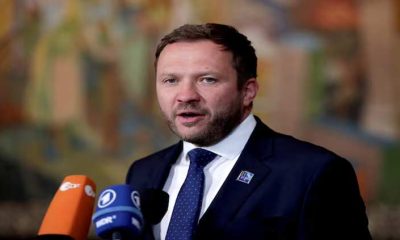The world wants more nuclear energy as a means to fight climate change and supply an ever-growing demand for electricity, part of a generational shift in thinking on atomic power, the head of the United Nations nuclear watchdog said Thursday.
Rafael Mariano Grossi, the director-general of the International Atomic Energy Agency, made the comments in an interview with The Associated Press at the COP28 climate talks. He called the inclusion of nuclear power at the summit, where he said a major nuclear agreement was likely, showed just how far the formerly “taboo” subject had come decades after the disasters at Three Mile Island and Chernobyl.
However, he acknowledged the challenge still posed for his agency in monitoring nuclear programs in countries, particularly in Iran after the collapse of its 2015 nuclear deal with world powers.
“This used to be easier when this international consensus was there and so Iran could see that this was not about political pressure, but a widespread approach that was to see a Middle East, one of the — if not the most — volatile region in the world, not to add to the mix the possibility of a country getting nuclear weapons,” Grossi said.
Grossi said more countries getting nuclear weapons could create a “domino effect.”
“So it’s a very, very complicated and potentially dangerous trend,” he said.
Grossi, who had just arrived in Dubai from Paris, said he spoke with French President Emmanuel Macron about the likely nuclear announcement that will include “a public commitment in favor of nuclear energy, which in a way that we have never seen before.” He said such an arrangement with the backing of world powers could see nuclear energy become attainable by more nations.
Nuclear power does not produce greenhouse gas emissions, a plus as the world works to reduce emissions. Still, nuclear is sharply opposed by many environmentalists because of its waste.
Macron is expected to speak Saturday at the COP — or Conference of Parties. The talks are taking place just across the Persian Gulf from Iran, whose President Ebrahim Raisi is also expected to attend.
In Iran since the collapse of the deal, the IAEA’s access to the country’s program has been restricted, to the point that inspectors haven’t been inside its centrifuge manufacturing plant since February 2021.
Asked if it was possible centrifuges could have been diverted elsewhere by Iran outside of the IAEA’s watch, Grossi said: “We don’t know — and our estimation is that production is continuing.”
Meanwhile, Iran has begun pulling permission from veteran IAEA inspectors, further hampering its ability to monitor Tehran’s program as it now has enough enriched uranium to potential build several atomic bombs if it chose. Iran long has insisted its program is peaceful and U.S. intelligence agencies as recently as this year assessed Tehran is not actively taking steps to build a bomb.
“It’s like, you know, they took Messi out of the team,” the Argentine Grossi said, referring to his fellow countryman and soccer star Lionel Messi. “They took Cristiano Ronaldo out of the team and they say, ‘You still have a team,’ but yeah, but let’s be fair and play fair.”
Iran’s mission to the United Nations did not immediately respond to a request for comment regarding Grossi’s remarks.
Grossi cautioned that the war in Ukraine continued to target that country’s network of nuclear reactors.
However, safety fears over nuclear persist. Grossi noted the political pushback science can see in nuclear issues, particularly over Japan discharging treated and diluted wastewater from the damaged Fukushima nuclear plant into the Pacific Ocean.
China has banned Japanese fish imports over the discharges, which contain tritium at a level that the IAEA believes will have a negligible impact on the environment and human health.
“We stayed there and we have an independent monitoring,” Grossi said. “I think we are gradually being successful” at convincing people.
Grossi renewed his calls for Israel to join the Nuclear Nonproliferation Treaty and allow IAEA inspectors to sites like Dimona, which is at the heart of its undeclared atomic weapons program and is undergoing what appears to be its biggest construction project in decade.
He also called China, Russia and the United States’ ramping up of nuclear weapons programs “a very disturbing trend” that raises the risk of further proliferation around the world.
“Quite clearly, and because of these renewed tensions in the international scene, we see countries increasing their arsenals, saying it publicly and of course. concomitantly, with these other countries that do not have nuclear weapons saying, ‘Hey, why not us?” Grossi said.
Post Views: 78


 Sports3 months ago
Sports3 months ago
 Fashion2 months ago
Fashion2 months ago
 Sports3 months ago
Sports3 months ago
 pakistan3 months ago
pakistan3 months ago
 pakistan3 months ago
pakistan3 months ago
 World2 months ago
World2 months ago
 World2 months ago
World2 months ago
 Sports2 months ago
Sports2 months ago




















